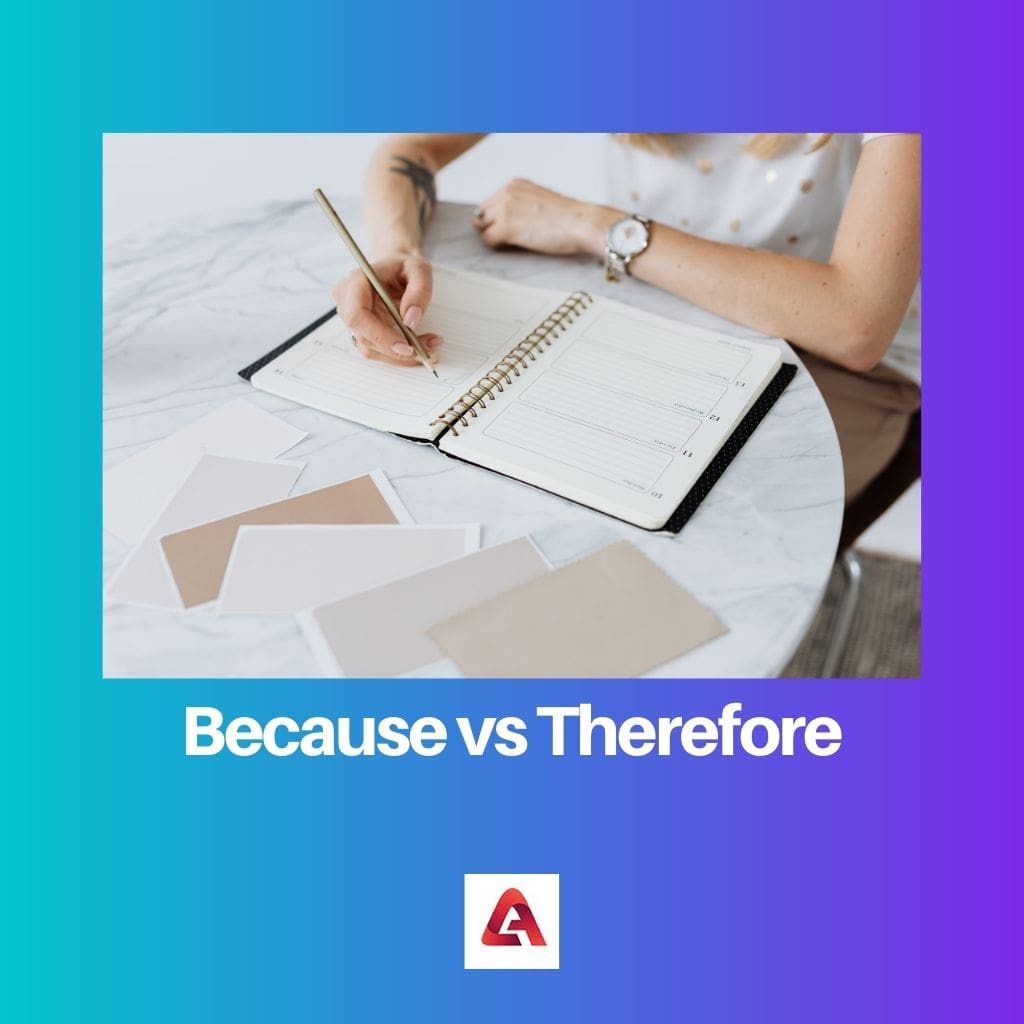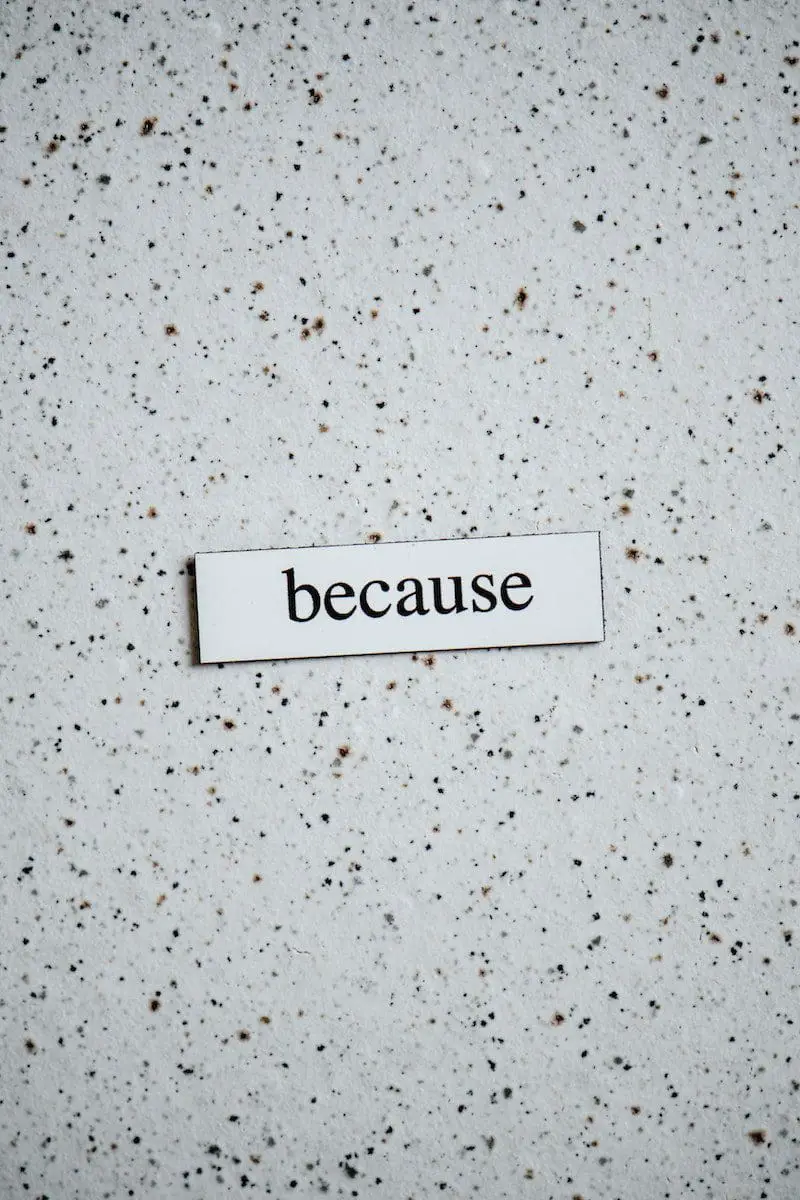“Because” introduces a reason or cause, connecting the preceding statement with its explanation. It denotes a causal relationship, providing context or justification for a particular action or situation. On the other hand, “therefore” indicates a logical consequence or conclusion drawn from the preceding information or argument. It signifies the result or outcome that logically follows from the given premises or conditions.
Key Takeaways
- “Because” is a conjunction used to introduce the reason or cause of an action or event; “therefore” is an adverb used to indicate a conclusion or inference based on previously presented information.
- “Because” shows causation, while “therefore” shows a logical consequence or result.
- Both “because” and “therefore” help establish relationships between ideas, but “because” explains the cause or reason behind an event, while “therefore” presents a conclusion based on previous information.
Because vs Therefore
“Because” is used to introduce a reason or explanation for something, indicating a causal relationship between two events or actions. “Therefore” is used to indicate a conclusion that follows logically from something else, indicating an inference that can be drawn from the evidence presented.

‘because’ and ‘Therefore’ are used separately whenever reasoning is involved in the sentence. However, their usage primarily depends on whether the reason is being provided (i.e., because)or the result of the reasoning is being conveyed (i.e., therefore).
Comparison Table
| Feature | Because | Therefore |
|---|---|---|
| Function | Connects clauses to show a causal relationship between them. | Connects clauses to show a logical conclusion based on the information presented in the first clause. |
| Cause and Effect vs. Conclusion | Establishes the first clause as the reason for the second clause. | Draws a conclusion or inference based on the information in the first clause. |
| Sentence Position | Can be placed at the beginning, middle, or end of the sentence, depending on the emphasis desired. | Usually placed at the beginning of the sentence or after the first clause it introduces. |
| Emphasis | Emphasizes the cause-and-effect relationship between the clauses. | Emphasizes the logical connection and highlights the conclusion derived from the first clause. |
| Examples | * He arrived late because of the traffic jam. * I studied hard, because I wanted to get a good grade. * She went for a walk because the weather was nice. | * It is raining today. Therefore, we cannot go outside. * She is intelligent and hardworking. Therefore, she is likely to succeed. * The experiment failed. Therefore, we need to revise our approach. |
Definition:
“Because” is a conjunction used to introduce a reason or cause, explaining why something is true or happening. It establishes a causal relationship between the preceding statement and its explanation.
Usage Guidelines:
- Explanation of Cause: “Because” is used to provide an explanation or justification for a particular action, event, or situation. It clarifies the reason behind a statement or occurrence.
- Informal and Formal Writing: While “because” is commonly used in both informal and formal writing, its frequency may vary depending on the context. In academic or professional settings, it’s used to provide reasoning or support for arguments.
- Clarity and Coherence: Employing “because” enhances the clarity and coherence of writing by explicitly stating the cause-and-effect relationship between ideas or events. It helps readers understand the rationale behind a statement.
- Avoid Redundancy: While “because” is crucial for explaining causality, it’s essential to avoid overusing it. Repetitive use can make writing sound monotonous or simplistic. Instead, vary sentence structure and consider alternative ways to express causation.
Example Usage:
- Everyday Language: “I couldn’t attend the meeting because I was feeling unwell.”
- Academic Writing: “The decline in biodiversity is alarming because it threatens ecosystem stability.”
- Technical Reports: “The software crashed because of a memory leak in the latest update.”
- Legal Documents: “The defendant was acquitted because the evidence against them was insufficient.”

When to Use Therefore?
Definition:
“Therefore” is an adverb used to indicate a logical consequence or inference derived from preceding information or arguments. It signals the result or conclusion that logically follows from the given premises or conditions.
Usage Guidelines:
- Logical Consequences: “Therefore” is employed to show a cause-and-effect relationship between statements or events. It signifies that the conclusion drawn is a direct outcome of the preceding information or reasoning.
- Formal Writing: In academic, scientific, or formal writing, “therefore” is frequently used to make logical connections explicit, particularly in arguments, proofs, or analyses.
- Transition: It serves as a transition word, guiding readers from the premise or evidence presented to the logical conclusion reached, enhancing coherence and clarity in the text.
- Avoid Overuse: While “therefore” is essential for clarity and coherence, excessive use can make writing sound repetitive or mechanical. It should be used judiciously, primarily to highlight crucial logical connections.
Example Usage:
- Scientific Writing: “The experiment yielded significant results; therefore, we can conclude that the hypothesis is supported.”
- Legal Documents: “The defendant failed to provide evidence for their alibi; therefore, the jury found them guilty.”
- Mathematical Proofs: “Given that A equals B, and B equals C, therefore, A equals C.”
- Policy Recommendations: “The current economic trends indicate a need for austerity measures; therefore, the government should consider reducing public spending.”
Main Differences Between Because and Therefore
- Cause vs. Effect:
- Because: Introduces the reason or cause behind a statement or situation.
- Therefore: Indicates the logical consequence or inference drawn from preceding information or arguments.
- Causal Relationship:
- Because: Establishes a causal relationship between the preceding statement and its explanation.
- Therefore: Highlights the result or conclusion that logically follows from the given premises or conditions.
- Explanation vs. Conclusion:
- Because: Provides an explanation or justification for a particular action, event, or situation.
- Therefore: Signals the logical consequence or inference derived from the preceding information or reasoning.
- Usage:
- Because: Used to clarify the reason behind a statement or occurrence in both informal and formal writing.
- Therefore: Employed to make logical connections explicit, primarily in academic, scientific, or formal writing, to enhance coherence and clarity.
- Frequency:
- Because: More commonly used in everyday language and writing to explain causality.
- Therefore: Often found in academic or professional writing to signify logical conclusions or consequences.
- https://dictionary.cambridge.org/dictionary/english/therefore
- https://dictionary.cambridge.org/dictionary/english/because
- https://www.thesaurus.com/browse/therefore

The comparisons made between ‘because’ and ‘therefore’ are compelling. I particularly found the sample sentences helpful in understanding their usage in context.
The article employs an engaging approach to analyze the usage of ‘because’ and ‘therefore’. It instigated a reevaluation of my understanding of these terms.
This article provides an in-depth analysis of the use of ‘because’ and ‘therefore’ in the English language. Great job in explaining the differences between the two and the appropriate contexts in which to use them.
This piece offers a beneficial exploration of ‘because’ and ‘therefore’ for those looking to refine their language skills. The examples were especially illuminating.
I’d argue that the article’s portrayal of ‘because’ and ‘therefore’ is comprehensive and well-presented. I’m impressed by the attention to detail in elucidating their differences.
This article is an excellent resource for anyone looking to grasp the finer details of language use. The breakdown of ‘because’ and ‘therefore’ is commendable.
I appreciate the clarity in the comparison between ‘because’ and ‘therefore’. It makes it easier to understand when to apply each, especially given their different grammatical usage.
It’s intriguing to see the nuances between ‘because’ and ‘therefore’ and how they can impact the understanding of a given statement. Great insights!
The contrast between ‘because’ and ‘therefore’ has been effectively elucidated in this article. The inclusion of scenarios illustrates the distinction between the two terms.
While the explanation of ‘because’ and ‘therefore’ is thorough, it could be enhanced with more examples to further illustrate the points. However, it remains an educational read.